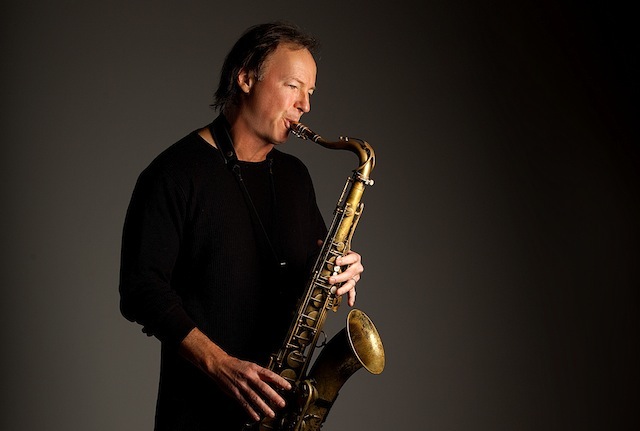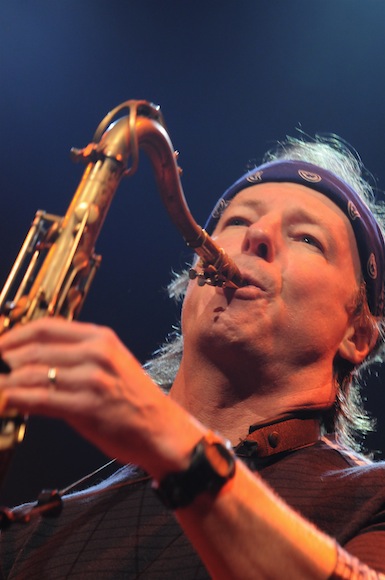World Class Saxophonist Bill Evans Is Ready To Make Chicago Home Again
By Katie Karpowicz in Arts & Entertainment on Aug 29, 2014 7:00PM

Photo courtesy Bill Evans
Despite the fact he was born in Clarendon Hills (about 30 minutes Southwest of the city) and lived in the area his first 18 years of his life, this weekend marks revered saxophonist and jazz musician Bill Evans' second stop in 30 years in Chicago as a solo musician.
Evans' career received its first boost when Miles Davis invited him to join his band in the 1980s. From there, he's worked with everyone from Bela Fleck to Mick Jagger to Herbie Hancock. Why haven't you heard more about him then, you ask? Evans found success early on in Europe and has been hitting the touring routes hard there for years. He's finally ready to focus more on stateside shows and bring his music back home.
Evans comes to Evanston this Sunday, Aug. 31, to play SPACE with his current group Soulgrass—a blend of rock, jazz, funk, folk and everything else that's inspired him in the last 30 years of touring.
Before the show, we had a chance to speak with Evans about the early days of his career and why he's been out of the States for so long:
CHICAGOIST: Hi, Bill. Thanks for talking with us today. I know you're originally from the Chicago area. Where have you been living since then?
BILL EVANS: After high school I moved away in 1976 and I've been living on the East Coast the whole time. I was in New York City for a time and for the past 18 years I've been living an hour north of the city. But of course I have a lot of friends back in Chicago. Have you ever heard of the band Umphrey's McGee?
C: Of course.
BILL EVANS: [laugh] Some people say no and others say, yeah, of course! We did a little thing with some guys from my band and some guys from their band at The Abbey last fall which went really well, but otherwise it's kind of a rare thing for me to be in Chicago. I'm excited to get a little press out there and get some people in town. Every year I play in Madrid, Barcelona, Paris, London, Rome, all of these cities dozens of times so it's like playing a hometown everywhere else but here. I built up some really nice audiences in other parts of the world so I need to do it here.
C: So, my next question was going to be what some of your favorite places are to listen to jazz around Chicago but I imagine if you're not here to play a lot you don't get a lot of time to visit either.
BILL EVANS: I never do in any city, really. These past two months I think I've played in 35 different cities so I don't really get a chance to hang out and go hear music. When you're on the road, you show up to a city, find out if you have any time to either go to the gym in the hotel or take a nap because you got up at four in the morning after two hours of sleep. Then you go to the soundcheck, you play the concert and the next morning you're in the next city by 10 a.m. It's a blur. I've woken up in hotel rooms and don't even know what country I'm in. [laughs]
C: Being a traveling musician does seem like a pretty tough lifestyle sometimes.

Photo courtesy Bill Evans
C: Is that where the name Soulgrass comes from? When I first heard it, I assumed it was kind of a play on soul and bluegrass.
BILL EVANS: I don't know anything about bluegrass to be honest with you. I just like the sound of the banjo. It's like a percussion instrument. Fortunately, Ryan Cavanaugh is one of the best banjo players in the world and he's just as adept at playing jazz at the highest level as he is at bluegrass.
I'm a jazz musician first. When I say that I mean you have to take your improvisation to the highest level and then from there it just gives you the ability to do a lot of different things in music. It's a hard thing to learn. It's a difficult language and when you get to a certain point you can play blues and rock and funk and other things that other people can't but I'm inspired by fresh sounding things. I'm inspired by great songs and great musicians. That's why I do what I do. The musicians I have are fantastic musicians in their own right and everybody loves playing in the group. It's sort of The Allman Brothers meets Umphrey's McGee meets whatever. We're also not going up there and playing something so introspective that we could care less if the audience is into it. We want to reach the audience.
C: I know you've done dozens of different things since and have a lot to your name but I think one of the most notable things about your career is that you worked with Miles Davis. Not only that, but you were just 22 years old when you joined his band. How does such a young musician wind up playing with one of the greatest jazz musicians that ever lived?
Bill Evans: I'll never get tired of answering this question but it's almost as if someone where to ask someone in their 50s, by the way, let's talk about your third grade teacher. What was it like in her class?
C: [laughs] I know. I'm sorry. You're probably so tired of getting that question.
BILL EVANS: No, no. It's an honor to be able to answer it. For me it's light years away. I was just fortunate that he liked the way I played. I was recommended and then I recommended Mike Stern and Jon Scofield when Miles asked me for musicians. Miles and I got to be friends after he wanted me to play in a band he was getting ready to start. We put it together, together. I don't know how to compare it to anything else. It was just a very fortunate thing to, first, get to know him and then to tour and record with him. It's always a myth to me how he built himself up to such epic proportions. Even aside from the music, he just sort of built this enigma around his name. I obviously know him differently than the rest of the world so it's always interesting to see it from the inside out.
C: Another question I'm sure you get asked all the time but I just have to ask is who has been your favorite person to work with so far?
BILL EVANS: You know what, everybody's different so there's no favorite. Everybody plays a different kind of music. It's like somebody asking you, whats better: a banana, an orange, a nectarine or a plum. To which I say, well, sometimes in the afternoon I want a nectarine but sometimes in the morning I want bananas. They're all so different, there's really no favorite that rules above all others. They've all added something new and different that I've been fortunate to learn from. I like it when a musician is a little more rounded and not solely, one hundred percent into music. You get a lot of eclectic musicians out there, some that are more extreme than others. You have to be a psychiatrist in order to work with them. I like the people that are more normal. The thing to remember though is that I'm not getting together with these people because we met at a bar and had a great time. We're getting together to create music and if we become good friends, that's a bonus.
C: As someone who's in their 50s and who has a resume, and I mean this in the very best way, of someone much older, where do you go from here?
BILL EVANS: Well, you always feel like you're just starting and at this point what I'd like to accomplish point blank is being able to play more in the States and build up my audiences there. It's a lot of work and I have to put my ego aside because I've been doing that in other countries for years. I'm just beginning here though. When we play [a U.S. show] sometimes there's 100 people there, sometimes there's 50 and sometimes there's 500 or more, but the audiences aren't at the level I have in other countries only because I was playing there with my old band for 25 years, two or three times a year.
C: What was it that lead you to be so active overseas as opposed to your home country? Was that a conscious decision?
BILL EVANS: That's a good question. Things just took off in Europe in the early 90s to the point that I was playing so many dates there that I didn't feel like I wanted to play more. So when I was doing three tours for three or five months a year in Europe, I would spend the rest of the time recording another record or doing something else in my life. I didn't feel like, wow, I need to play more concerts so I never approached a U.S. booking agent. So for the first ten years I just played really hard at all of the festivals in Europe in spring, summer and fall. But the music I've been doing in the last nine years is so conductive to audiences here [in the U.S.] that it's a shame not to do it.
Bill Evans' Soulgrass plays SPACE Evanston on Sunday, Aug. 31, at 8 p.m. Tickets are on sale now starting at $17.